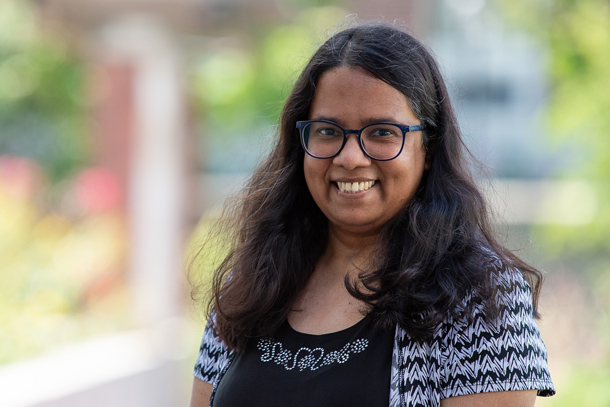
Amrita Basak, assistant professor of mechanical engineering in the Penn State College of Engineering. Credit: Kelby Hochreither/Penn State
Amrita Basak receives NSF CAREER Award
March 18, 2024
UNIVERSITY PARK, Pa. — Amrita Basak, assistant professor of mechanical engineering in the Penn State College of Engineering, earned a five-year, $598,650 U.S. National Science Foundation (NSF) Early Career Development (CAREER) Award for a project titled “Understanding Processing-Structure-Property Relationships in Co-Axial Wire-Feed, Powder-Feed Laser Directed Energy Deposition.”
Q: What do you want to understand or solve through this project?
Basak: This CAREER grant supports research aimed at understanding the relationships between processing, structure and property in metallic components used in additive manufacturing, or 3D printing. The 3D-printing technique known as co-axial laser-directed energy deposition, which I will investigate, offers the opportunity to construct and repair parts in layers using both powder and wire feedstocks. Wire feedstocks necessitate high laser energy for melting and unstable melt pools result in reduced processability. Conversely, powder particles, being smaller and possessing a higher surface area, are easier to melt and fuse with reduced instability.
This research project integrates the advantages of both powder and wire feedstocks — powder's improved processability and wire's higher deposition rate — to establish a new additive manufacturing paradigm.
Q: How will advances in this area impact society?
Basak: The knowledge enables wider adoption of wire-based additive manufacturing, holding the potential to fabricate large-scale parts for power generation, propulsion and space exploration at reduced cost and material waste. Thus, the research augments U.S. manufacturing, competitiveness and economy.
Q: Will undergraduate or graduate students contribute to this research? How?
Basak: Graduate and undergraduate students will have opportunities to develop their leadership skills by getting involved in multiple educational and outreach activities, complete formal leadership development training and execute on their learned principles. The project facilitates networking opportunities and assists individuals in making informed career choices while providing training that empowers future engineers to achieve professional excellence while prioritizing their personal well-being.
Q: The NSF CAREER award not only funds a research project, but it also recognizes the potential of the recipient as a researcher, educator and leader in their field. How do you hope to fulfill that potential?
Basak: One of our group’s long term research goals is to build unique research capabilities by contributing to the development of functionally graded structures. While powder-based laser directed energy deposition is a possibility, this project allows us to build parts with high deposition rates using wire feedstocks that use in situ powder addition. Through this research thrust, we can contribute to building a manufacturing workforce by training the next generation of scientists and engineers.



